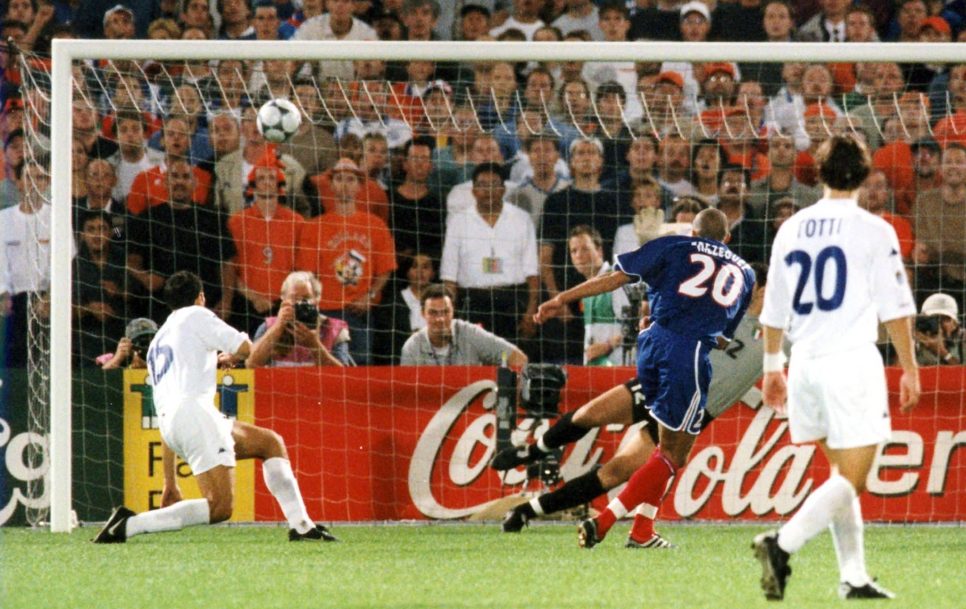One kick to rule them all: The brief reign of the Golden Goal
Remember the Golden Goal? Once hailed as football’s ultimate game-changer, it was meant to make the beautiful game even more thrilling. But instead of sparking attacking play, it often led to teams bunkering down in extra time, fearing that one fatal mistake would end it all.
The idea of a Golden Goal isn’t anything new, as it actually dates back to the early days of football. In 1867, during the Youdan Cup, the rule was extremely simple: the first team to score in extra time (which lasted for 60 minutes back then) wins.
Fast forward to the late 20th century, when FIFA, looking to inject some life into the increasingly defensive style of international football, decided to give the Golden Goal another shot. It was first introduced at the 1993 FIFA Youth World Cup, where Australia’s Anthony Carbone etched his name in history as the first-ever Golden Goal scorer.
The rule gained more momentum after the dull 0-0 draw in the 1994 World Cup final between Brazil and Italy, which was only decided by penalties. Then-FIFA president Sepp Blatter, reflecting the mood, lamented, “We are not happy, and the teams are not happy to go to penalty kicks, but we have to have a winner.”
Thus, the Golden Goal slowly but surely gained ground, and by the 94/95 season, it was already adopted by the English FA, resulting in Paul Tait scoring the 103rd-minute winner in the League Cup final for Birmingham City.
After that, UEFA followed suit, using the rule in the Euros and European competitions, though notably not in the Champions League.
The wider world got its first taste of the Golden Goal at Euro ’96, with Germany’s Oliver Bierhoff becoming a hero (or a villain, depending on your allegiance) by netting one in the final against the Czech Republic.
At the 1998 World Cup and Euro 2000, it was France who benefited most from the rule, with Laurent Blanc, Zinedine Zidane, and most famously, David Trezeguet, scoring Golden Goals that helped them win back-to-back titles.
Yet, as thrilling as these moments were, the Golden Goal often had the opposite effect of what was intended. Teams, terrified of conceding, played more cautiously in extra time, leading to dull, cagey affairs rather than the high-octane finishes FIFA had hoped for.
Thus, by the 2002 World Cup, the Golden Goal was already on its way out, but not before a few underdogs used it to upset the odds. Senegal and South Korea both advanced to the quarter-finals thanks to this rule, and Turkey’s İlhan Mansız scored what many mistakenly believe was the last Golden Goal in history to knock out Senegal.
In reality, the last-ever Golden Goal in international play came a year later, in the 2003 Women’s World Cup, when Germany’s Nia Künzer headed her team to victory over Sweden in the final.
But when it was finally removed, many rejoiced, including later France head coach Raymond Domenech, who said: “I’m very pleased with the decision. The first time I saw a golden goal was in Montpellier in 1994, during the U-21 European Championship match between Italy and Portugal. I felt so bad for [Luis] Figo and his teammates at the end. After the golden goal, it was ages before the Italians realized that they had won. It did the sport an injustice.”
Ottmar Hitzfeld, who at the time was the coach of Bayern Munich, also celebrated the end of the Golden Goal. “I’ve never been a fan of the Golden Goal. When extra-time arrives, you have 30 minutes to win it; the Golden Goal hasn’t always been fair. One shot and it’s all over. Scrapping it was a good idea.”
But before it was completely scrapped, FIFA also tried out a Silver Goal. This variation gave the losing team until the end of the 15-minute extra-time period to equalize, but it was even less popular and was dropped after just one tournament.
However, the world did manage to see one Silver Goal in Euro 2004 when Traianos Dellas scored for Greece in the semi-final against the Czech Republic. The irony: it pretty much turned out to be a Golden Goal, as Dellas’ header happened in the 105th minute, aka the last minute of extra time’s first half.
By 2004, both the Golden and Silver Goals were relegated to the dustbin of football history – except, bizarrely, in the NCAA, where the rule lingered until 2022, deciding several collegiate championships.
Bonus story: crazy Golden Goal gamble
Don’t ask why, but during the 1994 Caribbean Cup, someone decided to add a bizarre twist to the rulebook: the Golden Goal would count as double.
Here’s how it played out: In the first round of the qualifiers, Puerto Rico defeated Barbados 1-0 in regular time, earning a straightforward win. But when Grenada won their next match against Puerto Rico with a single goal in extra time, they were credited with a 2-0 victory.
That meant Barbados needed a two-goal win against Grenada in their final match to advance. And they were leading 2-0 until the 83rd minute when Grenada managed to pull one back.
With their backs against the wall, the Barbados players realized they might not get the crucial third goal, so they did something unthinkable – they deliberately scored an own goal to make it 2-2, forcing extra time.
Why? Because in extra time, one Golden Goal would automatically give them the two-goal margin needed.
Grenada players quickly caught on and decided to score an own goal themselves, as a one-goal loss would still see them through. This led to a surreal scene where Barbados players were defending both their own goal and Grenada’s to prevent any goals!
In the end, Barbados managed to push the game into extra time, where they scored the Golden Goal they needed, winning 4-2 and advancing to the next round.







